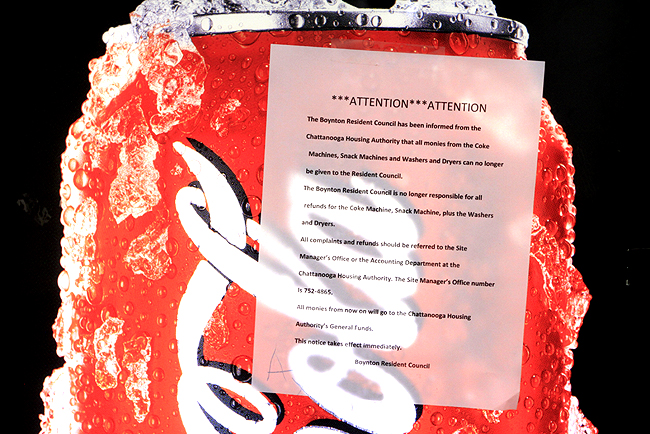Public housing residents living in high-rise buildings for the elderly and disabled have grown accustomed to using proceeds from vending machines and laundry facilities to pay for Christmas parties and other activities.
But Chattanooga Housing Authority officials recently told residents that the money must be put into the housing authority's general fund instead.
"It is pretty cheesy for them to take that money," said Carl Kendricks, president of Gateway Towers. "They should be doing things to help residents."
The money provided Christmas parties, cookouts and bingo game prizes for more than 500 elderly and disabled residents living in CHA's three high-rise buildings: Gateway Towers, Boynton Terrace and Mary Walker Towers.
Kendricks is among several resident leaders disappointed that the money, which he said residents had used for years, no longer will be available.
"It's not like the housing authority is going broke," he said. "All the money they get in rent from residents. It's really sad to take the money."
Together, the three high-rise buildings generate about $10,000 a year from laundry services. And Boynton, the largest site, got about $300 a year from snack machines, said CHA officials.
CHA Resident Services Director Carol Johnson said the authority decided to take the money after she attended a CHA-hosted budget training session.
During that meeting, June Oliver, financial analyst with the U.S. Department of Housing and Urban Development, said that "any proceeds from sales from vending or laundry facilities are to be put into the Chattanooga Housing Authority's general fund," according to a letter dated Feb. 28 that Johnson sent to resident council members.
"We have been advised by HUD to make the necessary corrections to ensure that these housing authority funds are accounted for accurately," Johnson wrote in the letter. "The CHA is to make these changes effected immediately."
Residents at Mary Walker Towers are especially surprised by the decision because it was the residents who initiated efforts to get the vending machines. The Coca-Cola machine at Mary Walker was brought in during the late 1990s and residents got the snack machine about five years ago, said Mary Ruth Robinson, a CHA board member and president of Mary Walker Towers.
"We called the Coca-Cola Bottling Co. and asked them to bring the machines in here," she said.
She said the activities financed by the vending machine and laundry money motivate elderly and disabled residents to get out of their rooms and participate in group gatherings.
Residents can't have programs without money, Kendricks said. HUD provides some money to pay for snacks during monthly meetings, but its use is restricted, said Joe Clark, president of Boynton.
Money can be used to buy peanuts and chips, but not the meat and full-menu items served at a Christmas party, Clark said.
Kendricks said he had hoped to use the money eventually to get new furniture in the lobby at Gateway and a lectern for people who lead Bible study meetings.
Clark said that, despite HUD's statement that the money is to be put in the general fund, CHA could allow residents to use proceeds from the vending machines.
"The money should be used for the benefit of the residents, for picnics, card games, pingpong balls, bingo gifts, anything residents want," Clark said. "It's their money."
